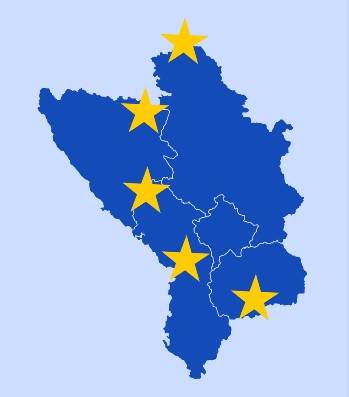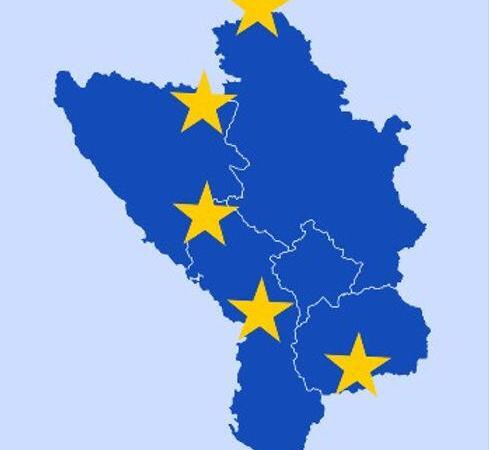Abstract: The world still experiences growing threats of terrorism and violent extremism. As a global counter-terrorism actor, the European Union has developed numerous policies and instruments, such as the Western Balkan counter-terrorism initiative, to combat global terrorism and violent extremism. Since there have been conflicting opinions regarding the EU’s competency as a counter-terrorism actor, this essay will analyse the EU’s role and the effectiveness in the combat of terrorism in the Western Balkans.
Bottom-line-up-front: The Western Balkan counter-terrorism initiative has been deemed to be partially effective. Even though the EU is continuously developing the WBCTi’s working policy, both the EU’s role and competency to carry out the initiative were questioned. However, since the project is still young and, it will take time to develop more concrete mechanisms to increase efficiency. In turn it would still fully establish control over countering terrorism and violent extremism in the Western Balkans.
Problem statement: How to improve the cooperation, coherence and coordination between the actors engaged in countering terrorism and violent extremism in the Western Balkans? To beat competitors that can spend far more resources than me?
So what?: The EU needs concrete mechanisms in the WBCTi to support the implementation of established policies and unleash its potential to fulfil the commitment to effectively fighting terrorism in the future.

Source: shutterstock.com/M-SUR
The European Union’s (EU) role and effectiveness in countering terrorism and violent extremism is still a largely debated topic. Even though the EU placed vast importance and engagement into countering terrorism, there are conflicting opinions on its competency. While one side recognises the EU as a “paper tiger” and deem it inefficient in the fight against terrorism, another would praise it due to its support towards integration and cooperation between member states, international organisations and third countries.[1]
Even though the Islamic State (IS) lost its territories in Syria and Iraq in 2019, the possibility of new global terror attacks is still not excluded. On the contrary, terrorism and violent extremism unchangingly present significant threats to global peace and security, due to their complexity and unpredictability. In recent years we have seen an increasing number of terrorist attacks in European countries. More precisely, due to an altered strategy of assault, the IS’s sympathisers were called upon and encouraged by terrorist leaders to carry out attacks in their home countries, instead of joining them in the Middle East.[2]
However, Europe would not perceive this particular threat, if in the recent years there was not a significant increase in the number of European citizens who joined the IS, most notably the citizens of the Western Balkan (WB) countries. Namely, since 2012 around 1070 nationals, primarily from North Macedonia, Kosovo along with Bosnia and Herzegovina have gone to Syria and Iraq, where they received training on how to perform terrorist activities.[3] The Western Balkans became the primary source of European foreign fighters in the Syrian conflict, and it still presents the most visible manifestation of a broader religious militancy phenomenon in the region.[4]
Namely, since 2012 around 1070 nationals, primarily from North Macedonia, Kosovo along with Bosnia and Herzegovina have gone to Syria and Iraq, where they received training on how to perform terrorist activities.
The Western Balkans region has produced a significant number of ongoing foreign fighters and presents a hub for Islamic extremists to reach the EU. There has been a growing concern that the WB region could become a recruitment centre and a sanctuary to foreign fighters. Moreover, the terrorists and weapons involved in a range of attacks on EU Member States, the USA and even the Middle East, were traced back to the Western Balkans. [5] Through a new Integrative Internal Security Governance (IISG) approach, the EU pointed out the need for internal reforms. In this regard, the EU decided to foster cooperation with the WB partners through the Western Balkan counter-terrorism initiative (WBCTi), to maximise the potential of Regional Cooperation policy by incorporating all relevant security actors’ efforts in the area.[6] Furthermore, the progress of the WBCTi is assisted by a Joint Action Plan that outlines a concrete level of ambition presented through 5 objectives, which are common to all WB partners. However, the foreseen role of the EU throughout this process is primarily to foster dialogue and cooperation among WB partners and the EU and to support them in achieving specific deliverables. Moreover, the EU aims to encourage capacity building in WB and, therefore facilitates international policing and judicial cooperation, with a precise goal to respond to and neutralise threats deriving from terrorism and radical extremism. Additionally, the EU tends to stop foreign terrorist fighter’s return to Europe.[7] The only remaining concern so far is, the WBCTi’s actual efficiency and its functional role.
After the incidents in France and Austria in 2020, it became evident that there are shortfalls. The fact that the terrorist attack in the heart of Vienna was committed by an ISIL sympathiser originally from North Macedonia serves as a simple illustration of mismanagement problems the EU currently deals with. After almost 20 years of progressive actions by the EU to prevent terrorism and violent extremism, the need for more commitment to fight this threat on the global level, while assuring universal values of human dignity, equality, freedom, and solidarity, taken by the EU, became evident. The EU contributed to establishing a common perception of the terror threat as a law enforcement issue. She developed diverse instruments and fostered joint initiatives to tackle the problem.[8] Although it appears that the EU considered all the necessary aspects in establishing counter-terrorism policies, the fact remains that terror attacks are still common in Europe. The effectiveness of the EU as a counter-terrorism actor is questionable. The lack of coherence and coordination was considered a result of the incomprehensiveness of the counter-terrorism strategy and impossibility of the EU to provide the same standards among member states.[9] Therefore, the WBCTi aims to focus on one region’s issues and improve its capabilities and effectiveness, with core values aligned with the EU and its security policies.
The implementation of the WBCTi mostly depends on non-EU actors. Due to its non-binding character, there is still a specific mechanism missing, which is supposed to provide improved coordination among the member states and the EU institutions and possibly result in a more satisfying outcome.[10] Although the WB countries have been trying to join the EU for years now, working on their domestic reforms and aligning their security policies with the EU standards, the WBCTi has remained voluntary. This lack of authority makes the obligatory compliance impossible.
This lack of authority makes the obligatory compliance impossible.
Furthermore, the EU depends not only on the WB partners but also on the implementation of the WBCTi and non-EU actors such as DCAF and Regional Cooperation Council, which work on the realisation of the goals the priorities of the WBCTi strategies and policies.[11]
Even though the WBCTi has enough space for improvement, it presents a milestone in countering terrorism in the WB region. It also provides the EU with an opportunity to strengthen its role as a counter-terrorism actor. However, as a young initiative, the WBCTi is still missing concrete mechanisms that would help implement established policies and unleash its potential to fulfil the commitment to effectively fighting terrorism in the future.
Ana Kostić is a senior master student of Political Science at the University of Vienna with a keen interest in international affairs and security issues. Previous publications in the IIPE journal “The Review of International Affairs” (Vol. LXIX, No. 1171, July-September 2018) as a paper titled “How did the new Austrian government coalition change its refugee policy?”.
[1] Christian Kaunert, “Europol and EU Counterterrorism: International Security Actorness in the External Dimension”, Studies in Conflict & Terrorism, vol. 33, (2010): 653, DOI:10.1080/1057610X.2010.484041.
[2] Nedad Medic, “ Terorizam se tice svih nas”, DW Made for minds, published on 24.05.2017.
[3] Adrian Shtuni , “Western Balkans Foreign Fighters and Homegrown Jihadis: Trends and Implications.” Combating Terrorism Center (2019), 18.
[4] Idem.
[5] Anastasiia Kudlenko, “The Western Balkan counter-terrorism initiative (WBCTi) and the capability of the EU as a counter-terrorism actor”, Journal of Contemporary European Studies, vol. 27, (2019): 504, DOI: 10.1080/14782804.2019.1652148.
[6] Regional Cooperation Council. “Western Balkan Counter-Terrorism initiative”. Published on 02.08.2019. https://www.rcc.int/swp/news/209/download-all-relevant-pcve-documents-at-iisg-website.
[7] First Line Practitioners. Joint Action Plan on counter-terrorism on the Western Balkans https://www.firstlinepractitioners.com/cve-infrastructure/joint-action-plan-on-counter-terrorism-for-the-western-balkans
[8] Kudlenko, The Western Balkan counter-terrorism initiative, p. 511-512.
[9] Idem.
[10] Idem.
[11] Idem.






